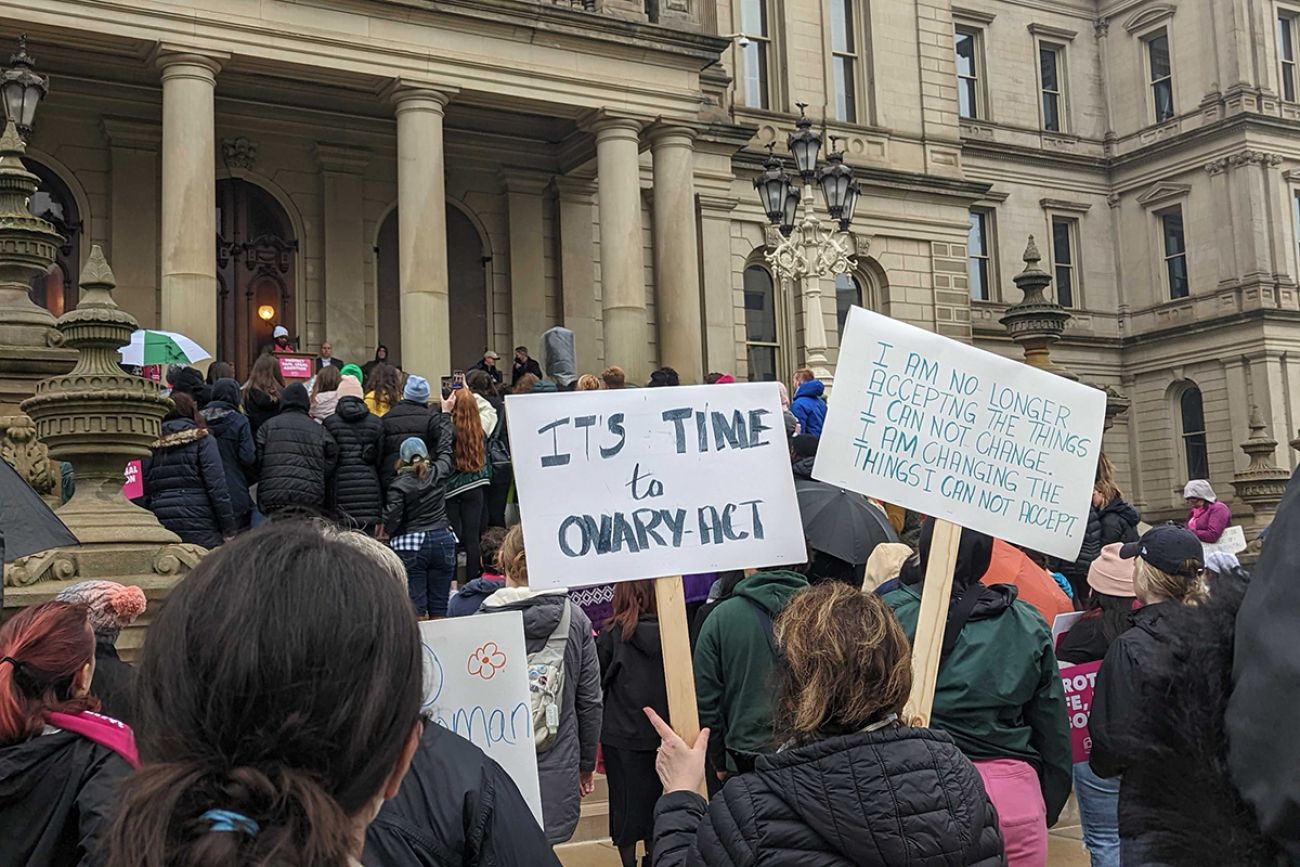Abortion providers may face charges in Kent, Jackson counties, attorney says

August 1: Michigan abortion ban is — then isn’t — in effect after two court rulings
LANSING — At least two county prosecutors would consider criminal charges against abortion providers despite a temporary injunction against enforcement of a 1931 ban, their attorney says, underscoring uncertainty over the legal status of abortion in Michigan.
Enforcement of the old law, which makes performing an abortion a felony by up to four years in prison, was suspended following a May injunction by a lower-court judge.
But David Kallman, a lawyer representing Republican prosecutors in Kent and Jackson counties, says the injunction only applies to the state, not county prosecutors.
Related:
- Abortion rivals say Roe reversal could have surprising impact in Michigan
- New Planned Parenthood CEO: We have abortion options for post-Roe Michigan
- Michigan's emotions span from tearful to jubilant over abortion ruling
“If there’s any prosecutor in this state right now today, and the police came to them with a investigation showing a doctor performed an abortion in violation of the statute, a prosecutor could prosecute right now — today — if they wanted to,” Kallman told Bridge Michigan.
The opinion contradicts assurances from Attorney General Dana Nessel and others that abortion remains legal in Michigan for now, despite Friday’s blockbuster ruling by the U.S. Supreme Court overturning Roe v. Wade, the landmark case that had guaranteed access to legal abortion for nearly 50 years, making it a state-level decision.
Planned Parenthood and other abortion providers have continued to provide abortions statewide since Friday, based on those legal assurances.
But much is in flux, especially with ongoing court cases in Michigan over the 1931 law as well as a petition drive that is gathering signatures to guarantee reproductive rights in the state constitution.
“It’s laughable to take the position that abortion is still legal in Michigan” because of a state-level injunction, Kallman argued. “That's ridiculous. That is simply not true.”
Kent County Prosecutor Christopher Becker told Bridge that law enforcement agencies have not yet brought him an abortion case for potential prosecution since Friday’s U.S. Supreme Court decision.
But if that happens, “I'm taking a look at it,” Becker said Monday morning.
“I’m not going to say yes (to prosecution) for sure, because every case is dependent on the facts that are brought in,” he said. “But I think the clearest thing I can say is, I'm not ignoring this law. It’s a validly passed statute. I'm not ignoring it, and we'll go from there.”
Jackson County Prosecutor Jerard said Tuesday there is a "legitimate question" as to whether the injunction applies to him but confirmed his attorneys have advised him it does not.
If a police agency brings him a case, he'd review it to see if there is evidence of a criminal violation but would also review the ongoing court cases before deciding how to proceed, Jarzynka told Bridge.
"It's not like you can flip a switch and suddenly police are investigation violations of Michigan's abortion statute," he said. "That's going to be a process."
Kent and Jackson are among the 13 Michigan counties with at least one abortion provider.
More than 1,400 women from Kent county had an abortion last year, accounting for about five percent of the 28,409 performed in the state, according to statistics from the Michigan Department of Health and Human Services. About 283 Jackson County women had an abortion last year.
Michigan Court of Claims Judge Elizabeth Gleicher last month issued a temporary injunction that prohibits the attorney general and anyone under her "control or supervision" from enforcing the 1931 ban while the court considers whether the statute is constitutional.
Nessel's office emailed county prosecutors a copy of that opinion indicating they do not have authority to enforce the 1931 ban while the injunction remains in place, according to court filings.
But asked Friday whether she is confident in that analysis, Nessel declined to take a legal position, saying it's a debate that may end up playing out in courts.
Robert Sedler, law professor at Wayne State University and special assistant attorney general to Nessel, told Bridge he believes the injunction against the 1931 abortion ban — which declared the ban unconstitutional — applies to all public officials, even though county prosecutors are not named parties in the court case.
“Once you have a declaration of unconstitutionality, it’s going to bind all government officials in the state of Michigan,” he said Monday. “Should they try to prosecute anybody, there would be an injunction against them and they could possibly be held in contempt.”
Kallman, the Republican prosecutors’ attorney, indicated his clients may be willing to test that theory if the Court of Appeals does not lift the injunction, which he’s asking a three-judge panel to do.
It’s “ridiculous” to claim county prosecutors, who are independently elected to separate offices, are “bound by that injunction against the attorney general,” Kallman said Monday. “They're not parties to the case. They had no involvement in it whatsoever. They're not named in the injunction or any of the pleadings.”
On Monday, when asked about Kallman’s assertions, Nessel’s office issued a statement saying “as it currently stands, providing abortion care in Michigan cannot be prosecuted, and I encourage those with appointments to move forward as scheduled and consult with their doctors.”
Deborah Labelle, an attorney for Planned Parenthood, disputed what she called a "rogue opinion" from Kallman. She said any prosecutor who ignores the injunction could end up back before Gleicher for contempt of court proceedings.
There’s “no basis” for county prosecutors to ignore the injunction, and they would be doing so at their “own risk,” LaBelle said.
The Michigan Legislature also interpreted the injunction to apply “statewide,” writing in a June 6 court filing that Gleicher’s decision prohibits “the Attorney General and all county prosecutors” from enforcing the 1931 abortion ban.
The Michigan Court of appeals on Monday denied Kallman's request for immediate consideration, meaning the injunction will remain in place for the time being. All briefs in the case are due July 5.
The injunction allowed clinics to maintain their licenses and insurance coverage for the time being, Planned Parenthood Advocates of Michigan executive director Nicole Wells Stallworth said Friday.
Nessel took the same position, telling reporters on Friday that “everything remains the same as it was yesterday.”
But to keep abortion legal in Michigan, Nessel said Friday the “best way” is to pass Reproductive Freedom for All, a ballot proposal that would enshrine abortion rights into the Michigan Constitution.
“The holdings of any court are tenuous in nature, and it’s up to the voters to codify these rights into law themselves and not to count on a court to do it for you,” Nessel said.
Even if the injunction is lifted, Nessel has repeatedly said she will not use any state resources to enforce the law or prosecute violators. And so have Democratic prosecutors in seven of 13 Michigan counties with abortion clinics, including population centers in Wayne and Oakland counties.
Republican attorney general candidate Matthew DePerno on Monday evening praised county prosecutors preparing to enforce the 1931 ban, calling it a "good thing to see" while vowing to do the same if he defeats Nessel in November.
"We will enforce the 1931 law unless it's modified or changed by the state Legislature," DePerno said in a Zoom call with fellow Republicans.
The petition drive Nessel supports is "sneaky and something we've got to defeat very quickly" because it would also undermine other existing abortion regulations, he argued
Democratic Gov. Gretchen Whitmer, meanwhile, is urging the Michigan Supreme Court to consider the constitutionality of the 1931 ban, which outlaws abortion unless it is necessary to preserve the life of the pregnant woman.
Whitmer on Monday renewed her request for immediate consideration, noting that "certain county prosecutors and health providers have expressed confusion about the current legal status of abortion in Michigan,” which she said “only underscores the need for the Michigan Supreme Court to act now."
The 1931 law does not define when a pregnancy might be considered life threatening, and it does not include any other exceptions allowing abortion in the case of rape or incest.
Anti-abortion groups and the two county prosecutors asking the Court of Appeals to lift the injunction contend Gleicher — the Court of Claims judge who issued it — should have recused herself from the case after disclosing she has donated to and previously represented Planned Parenthood.
Nessel is the named defendant, and because she refused to appeal the injunction, the case has "become a runaway train and only this court can apply the brakes," Kallman and Bursch wrote in a complaint asking the Court of Appeals to supersede and take over the case.
As an ACLU attorney at the time, Gleicher represented Planned Parenthood in a 1994 case that unsuccessfully asked Michigan courts to declare a constitution right to abortion, a determination the abortion provider is again asking the judicial branch to make.
Gleicher disclosed that history in an April letter from the Michigan Court of Claims clerk, indicating she is "certain that she can sit on this case with requisite impartiality and objectivity.” She is now a named defendant in the Court of Appeals case but did not respond by a June 13 deadline set by a three-judge panel.
Only Planned Parenthood replied, arguing complaints seeking to lift Gleicher’s injunction lack legal merit and “border on harassing and seeking to impugn the integrity of a sitting judge."
Editor's note: This story was updated June 28 to include comments from the Jackson County prosecutor.
See what new members are saying about why they donated to Bridge Michigan:
- “In order for this information to be accurate and unbiased it must be underwritten by its readers, not by special interests.” - Larry S.
- “Not many other media sources report on the topics Bridge does.” - Susan B.
- “Your journalism is outstanding and rare these days.” - Mark S.
If you want to ensure the future of nonpartisan, nonprofit Michigan journalism, please become a member today. You, too, will be asked why you donated and maybe we'll feature your quote next time!



